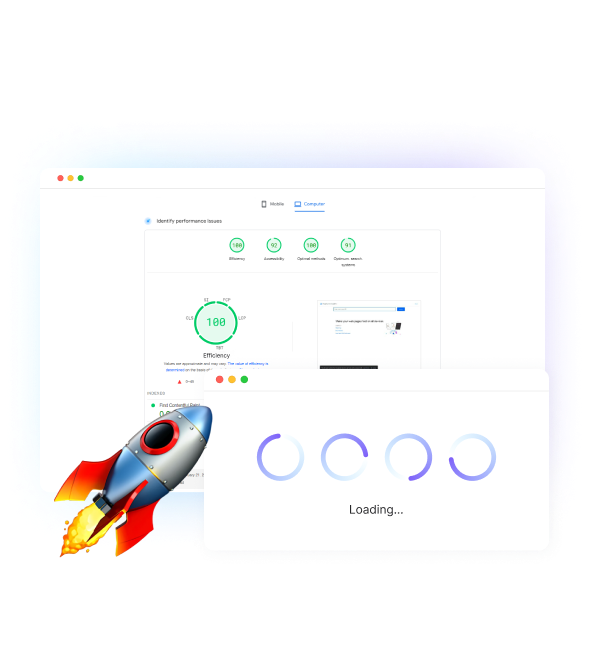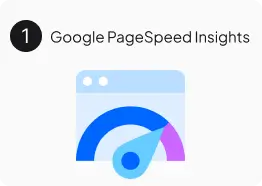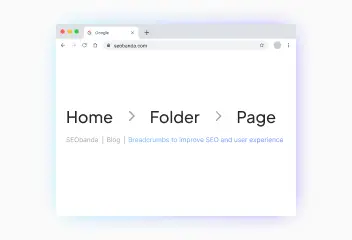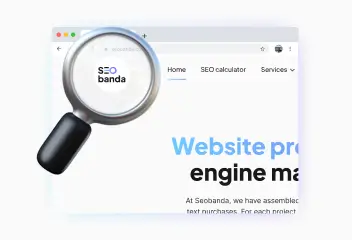Website loading speed
In our modern world, the pace of life has accelerated dramatically. Now people expect everything to be available in seconds. Websites are no exception. At a time when the attention of users is becoming an increasingly scarce resource, the speed of loading the site turns into a critical factor in the success of online business.



What is the loading speed of the site
The loading speed of the site is the time in which the web page is fully loaded and becomes available for user interaction. This may seem like a simple concept, but behind the scenes there is a complex process that involves transferring data from the server to the user’s device, rendering HTML, CSS and JavaScript, loading images and other media files.
There are certain parameters by which the download speed of the site is measured:
- 1-2 seconds – an excellent result;
- 2-3 seconds – good;
- 4-7 seconds – not bad, but better faster;
- 8-10 seconds – a bad result, optimization is necessary;
- more than 11 seconds – critically long, it is necessary to correct the situation as soon as possible.
As you can see from the above written information, if your site loads more than 3 seconds – this is no longer a good result, which can badly affect the user experience.


Why is website loading speed so important?

Most business owners want a quality and interesting site that will attract the attention of customers. For this, a design with a large number of complex elements, interactive and multimedia content is being developed. And here a potential client comes to your site, full of enthusiasm and willingness to make a purchase. But seconds pass, and the page is still white and empty. One, two, three… At the fifth second, the user, disappointed, closes the tab and goes to your competitor. You have lost not only a potential sale, but also the opportunity to make a positive impression and build a long-term relationship with the client.
That is, it is important to remember how quickly the content will load on your pages and optimize the site as needed. Otherwise, neither interesting design nor unique content your potential customers will not see and will not be able to make purchases from you.

Increase visibility
for your business: SEO solution for growth!


How the speed of loading a website affects its ratings in search engines
The speed of site loading affects all aspects of online presence – from user experience to positions in search results. Slow sites have higher bounce rates, lower conversion rates, fewer page views, and are worse ranked by Google. Conversely, fast sites attract and retain visitors, encourage them to action and as a result bring more profit.
For the user, the speed of loading the site is the first impression, which can be a decisive factor in whether it remains on the site or goes to competitors. Studies show that 40% of users leave the site if it loads longer than 3 seconds. Each additional second of delay results in 7% conversion loss, 11% reduction in page views, and 16% reduction in user satisfaction.
But speed is important not only for users – it’s also one of the ranking factors in search engines. Back in 2010, Google announced that download speed affects the site’s position in mobile issuance, and since July 2018, this factor began to be taken into account for desktop search results. Thus, slow sites not only scare away visitors, but also receive less organic traffic. Accordingly, this affects the position of the resource in the search results.


Main factors affecting download speed
Website loading speed depends on many factors – from code optimization and hosting quality to image optimization on the site. Understanding these factors is key to effectively optimizing the site and achieving lightning speed. Let’s look at the main ones:
- A page size that consists of various files: HTML, CSS, JavaScript, images, videos, etc. The larger it is (in kilobytes or megabytes), the longer it loads.
- The number of HTTP requests affects the download time, because each file on the page requires a separate HTTP request to the server.
- Server response time (TTFB), which depends on server performance, database optimization, caching, and server code efficiency.
- The browser can cache static files, such as images, CSS and JavaScript, so as not to reload them on subsequent visits to the site.
- The geographical location of the server affects the time it takes for the server to transfer data to users.
In summary, the speed of site loading depends on a set of factors associated with both the client and server parts.


Tools for verification
To effectively optimize the speed of site loading, it is necessary to regularly measure and analyze it. Fortunately, there are many free and paid tools that help to assess the speed of the site and identify potential problems. Some of the most popular are Google PageSpeed Insights, GTmetrix, WebPageTest and Pagespeed insights report. These tools provide valuable information about page loading speed, including total loading time, page size, number of requests, time to first byte (TTFB), etc.
However, it is important to understand that these tools usually measure the page loading speed in an isolated environment, without taking into account real conditions, such as the user’s Internet connection speed, device performance or the simultaneous loading of other pages in the browser. Therefore, the speed indicators obtained with these tools may differ from the actual user experience.
To get a more complete picture of the real speed of the site, it is useful to combine data from speed checking tools with other methods, such as:
Real testing by users from your target audience with feedback regarding speed and usability.

Use web analytics tools such as Google Analytics to track speed-related metrics such as bounce rate, site time, or conversion in real-world settings.

Use real-time monitoring tools like New Relic or Pingdom to monitor site performance and quickly detect and solve problems.

Always remember that the ultimate goal of speed optimization is not just to get high scores in tests, but to provide the best experience for your real users.

Increase visibility
for your business: SEO solution for growth!


How to increase website loading speed?
So we figured out why the high speed of loading the site is important for promoting the site in the results of search engines and what factors affect the speed. Now let’s see how you can optimize the site to speed up the speed of loading pages.
- Image optimization
- Images are often the largest files on the page and can significantly slow down loading. To optimize the image, use the correct format, reduce the file size by compression and use lazy loading to delay loading images that are outside the visible area of the screen.
- Minimizing code
- Cleaning HTML, CSS and JavaScript files by removing unnecessary spaces, comments and formatting can reduce the size of files and speed up their loading.
- Using browser caching
- Configuring caching headers for static files allows the browser to store these files locally and not reload them on subsequent site visits.
- Database optimization
- Optimizing database queries, indexing tables, and using caching can significantly reduce page generation time on the server and speed up loading.
- Using CDN
- A content delivery network (CDN) can cache static files on servers around the world and deliver them to users from a nearby location. This significantly speeds up downloads for users remote from the main server.
In summary, the optimization of the download speed of the site is a process that requires an integrated approach and constant attention.
You may also like it

Breadcrumbs to improve SEO and user experience
Breadcrumbs are a navigation element on a web page that helps users understand their location on the site and makes it easier to return to previous sections. They...

HTTP status codes: What do they mean and why are they important for SEO?
HTTP status codes are short three-digit responses that a website server provides to a client's browser in response to a request. Each http response code has its own...

Logo for the website: How to create a cool logo?
A logo is the visual face of your brand. It creates the first impression of your business and influences its recognition. Try to think of the logos of Nova Poshta...












